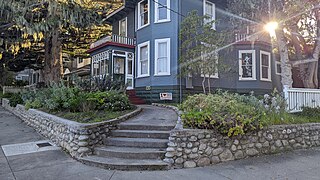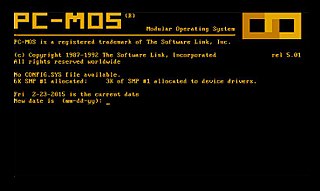Multi-user software is computer software that allows access by multiple users of a computer. Time-sharing systems are multi-user systems. Most batch processing systems for mainframe computers may also be considered "multi-user", to avoid leaving the CPU idle while it waits for I/O operations to complete. However, the term "multitasking" is more common in this context.

Xenix is a discontinued Unix operating system for various microcomputer platforms, licensed by Microsoft from AT&T Corporation. The first version was released in 1980, and Xenix would eventually become the most common Unix variant, measured according to the number of machines on which it was installed, in the mid-to-late 1980s. The Santa Cruz Operation (SCO) later acquired exclusive rights to the software, and eventually replaced it with SCO UNIX, later known as OpenServer, with the final Xenix version released in 1991.

Digital Research, Inc. was a privately held American software company created by Gary Kildall to market and develop his CP/M operating system and related 8-bit, 16-bit and 32-bit systems like MP/M, Concurrent DOS, FlexOS, Multiuser DOS, DOS Plus, DR DOS and GEM. It was the first large software company in the microcomputer world. Digital Research was originally based in Pacific Grove, California, later in Monterey, California.

Step-Saver Data Systems, Inc. v. Wyse Technology was a case in the U.S. Court of Appeals for the Third Circuit primarily concerned with the enforceability of box-top licenses and end user license agreements (EULA) and their place in U.S. contract law. During the relevant period, Step-Saver Data Systems was a value-added reseller, combining hardware and software from different vendors to offer a fully functioning computer system to various end users. Step-Saver's products included software produced by Software Link, Inc (TSL), computer terminals produced by Wyse Technology, and main computers produced by IBM. The fundamental question raised in this case was whether the shrinkwrap licenses accompanying TSL's software were legally binding, given that different terms were negotiated over the phone with Step-Saver prior to receiving physical copies of the software. The case was first heard in the United States District Court for the Eastern District of Pennsylvania, where the court ruled that the shrinkwrap licenses were legally binding. However, the U.S. Court of Appeals for the Third Circuit subsequently reversed this decision, ruling that the shrinkwrap licenses were not legally binding.

Multiuser DOS is a real-time multi-user multi-tasking operating system for IBM PC-compatible microcomputers.

PC-MOS/386 is a multi-user, multitasking computer operating system produced by The Software Link (TSL), announced at COMDEX in November 1986 for February 1987 release. PC-MOS/386, a successor to PC-MOS, can run many MS-DOS programs on the host machine or a terminal connected to it. Unlike MS-DOS, PC-MOS/386 is optimized for the Intel 80386 processor; however early versions will run on any x86 computer. PC-MOS/386 used to be proprietary, but it was released as open-source software in 2017.

Zenith Data Systems Corporation (ZDS) was an American computer systems manufacturing company active from 1979 to 1996. It was originally a division of the Zenith Radio Company, after they had purchased the Heath Company and, by extension, their Heathkit line of electronic kits and kit microcomputers, from Schlumberger in October 1979. ZDS originally operated from Heath's own headquarters in St. Joseph, Michigan. By the time Zenith acquired Heathkit, their H8 kit computer already had an installed fanbase of scientific engineers and computing enthusiasts. ZDS's first offerings were merely preassembled versions of existing Heathkit computers, but within a few years, the company began selling bespoke systems, including the Z-100, which was a hybrid 8085- and 8088-based computer capable of running both CP/M and MS-DOS.
FlexOS is a discontinued modular real-time multiuser multitasking operating system (RTOS) designed for computer-integrated manufacturing, laboratory, retail and financial markets. Developed by Digital Research's Flexible Automation Business Unit in Monterey, California, in 1985.
This article presents a timeline of events in the history of 16-bit x86 DOS-family disk operating systems from 1980 to present. Non-x86 operating systems named "DOS" are not part of the scope of this timeline.

Altos Computer Systems was founded in 1977 by David G. Jackson and Roger William Vass Sr. It focused on small multi-user computers, starting with multi-user derivatives of CP/M, and later including Unix and Xenix-based machines. In its 1982 initial public offering on NASDAQ, the company raised $59M. Thereafter the company's stock was traded under the symbol ALTO.

The Deskpro 386 is a line of desktop computers in Compaq's Deskpro range of IBM PC compatibles. Introduced in September 1986, the Deskpro 386 was the first personal computer to feature Intel's 32-bit 80386 microprocessor. It also marks the first time that a major component of the IBM Personal Computer de facto standard was updated by a company other than IBM themselves—in this case, upgrading from the 80286 processor of the Personal Computer/AT.
VM/386 is a multitasking Multi-user environment or 'control program' that took early advantage of the capabilities of Intel's 386 processor. By utilizing Virtual 8086 mode, users were able to run their existing text-based and graphical DOS software in safely separate environments. The system offered a high degree of control, with the ability to set memory limits, CPU usage and scheduling parameters, device assignments, and interrupt priorities through a virtual machine manager menu. Unique CONFIG.SYS and AUTOEXEC.BAT files could be configured for each application, and even different DOS versions. In 1991 the vendor announced intentions to support DPMI 1.0 in VM/386.
North Star Computers Inc. was an American computer company based in Berkeley, California existing between June 1976 and 1989. Originally a mail order business for IMSAI computers, it soon developed into a major player in the early microcomputer market, becoming first known for their low-cost floppy disk system for S-100 bus machines, and later for their own S-100 bus computers running either the CP/M operating system or North Star's own proprietary operating system, NSDOS. North Star BASIC was a common dialect of the popular BASIC programming language. They later expanded their lineup with dual-CPU machines able to run MS-DOS, and a server version running either DOS or Novell NetWare.

MS-DOS 4.0 was a multitasking release of MS-DOS developed by Microsoft based on MS-DOS 2.0. Lack of interest from OEMs, particularly IBM, led to it being released only in a scaled-back form. It is sometimes referred to as European MS-DOS 4.0, as it was primarily used there. It should not be confused with PC DOS 4.00 or MS-DOS 4.01 and later, which did not contain the multi-tasking features.
The Multiuser DOS Federation (MDOS) was an industry alliance to promote the growth and acceptance of multi-user DOS-based solutions on 286, 386 and 486 computers. It was formed in July 1990. Initially among them were Digital Research, Theos Software, SunRiver, DigiBoard, Alloy, Viewport International and others. The idea was to reduce costs by allowing workgroups to run DOS applications from a shared PC while working on terminals or workstations.

Librex Computer Systems Inc. was a short-lived American subsidiary of the Nippon Steel Corporation that manufactured notebook computers from 1990 to 1992. Librex had roots in Nippon Steel's Electronics and Information Systems Division (EISD) back in Japan, which starting in 1986 had formed joint ventures with several high-profile American computer companies. Librex was Nippon Steel EISD's first venture in the United States; it also set up Nippon Steel Computer PLC in the United Kingdom to sell identical products. The company's notebooks received praise in the technology press, but a fierce price war in the market for laptops in the early 1990s combined with dwindling profit margins compelled Nippon Steel to dissolve Librex in 1993.

Aox Inc. was a privately run American technology corporation founded by Michael and Linda Aronson in 1978. Over the course of its 22-year lifespan, the company chiefly developed software and hardware for IBM's PC and compatibles, for the Personal System/2, and for the Macintosh. In its twilight years, the company designed multimedia and teleconferencing devices and chip designs. Aox was founded after Michael Aronson graduated from Harvard University with a doctorate in physics; he stayed with the company until 2000, when he incorporated EndPoints Inc. and switched to full-time fabless semiconductor design.
Apparat, Inc., was an American software developer, peripheral manufacturer, mail order company, and retailer active from 1978 to 1988 and primarily based in Denver, Colorado. They are best known for NewDos/80, an alternative operating system to TRSDOS for Tandy Corporation's TRS-80 line of home computers, sold through their Radio Shack stores. Apparat themselves sold modified TRS-80s through their mail order catalog. The company pivoted to selling peripherals for the IBM Personal Computer in 1982, continuing in this market until Apparat went defunct in 1988.

The Multi-Personal Computer (MPC), better known as the MPC 1600, is a line of desktop personal computers released by Columbia Data Products (CDP) starting in 1982. The original MPC, released in June 1982, was the first commercially released computer system that was fully compatible with the IBM Personal Computer.












